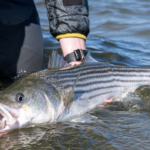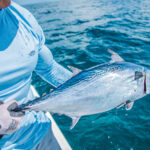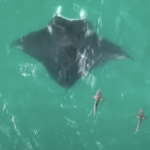
Talkin’ Striped Bass Spawn Dynamics
Consistent spawning production is paramount to a fishery’s long-term health. Many environmental factors are suspected
We caught this article a few days ago. Here’s the summary: Maryland striped bass commercial fishermen and the “harvest centric” charter-for-hires are fighting the latest management action by ASMFC. The for-hire sector believes there are more fish than ever, while the commercial sector doesn’t want to take a 7% reduction in quota (even though they haven’t hit their quota, so their proposed reduction is almost meaningless). There has also been a lawsuit filed which deserves a blog of its own, so stay tuned for that. In shortest terms: these quota-based anglers refuse to give up the fish they’re not even catching. Let that sink in.
It looks like Maryland is also going to try and give the for-hire charter fishermen two more fish. We uncovered this nugget of information from the article:
“However, despite this, Luisi says they are looking to give some relief to the industry, by offering an incentive to comply with the state’s electronic recording of the fish caught on board the charter boats, allowing a captain and first mate of the vessel to take an additional fish each. […] “If there are six people on the boat, they might be able to bring home eight fish instead of six fish, it’s not 12 but it’s 8,” Luisi said.“
This isn’t Conservation Equivalency (CE) and it is not related to ASMFC. It is a state issue. There isn’t a heck of a lot we can do to stop it. One of the major questions everyone should be asking: How is this enforceable? As many of the charter boats run two a day trips. The captain and mate can only take one fish per person once a day. Is this on the honor system? Are they going to tell the second trip that the two extra fish were taken by the first trip of the day? This grey area will never play-out in favor of the fishery.
If you’re astounded to hear that there’s push back on conservation efforts for stripers, just wait until you see what’s behind Door #2!
The Chesapeake Bay commercial fisheries are not planning to reduce their 2024 quotas by 7% as agreed upon by the entire coast at the last ASMFC hearing. Furthermore, Maryland and Potomac River Fisheries Commission (PRFC) are saying they will not pay potential overages back until 2026. This is not consistent with Addendum II or the Fisheries Management Plan. The Striped Bass Plan Development Team will submit a memo covering this to the Atlantic Striped Bass Management Board before the virtual hearing on March 26th for review.
We are eager to see this memo, as well as hear feedback from commissioners on this issue. Striper advocates from along the coast should have a keen eye on this situation. If Maryland and PRFC refuse to apply paybacks due to overages in 2025, the only recourse is to find both jurisdictions out of compliance at the board meeting at the beginning of May. Noncompliance would have serious implications for the entire fishery within those jurisdictions. We will provide a summary of that virtual hearing shortly after it wraps up.
Maryland has not taken a meaningful reduction in the striped bass commercial fishery in a decade. Even then, Maryland took a 14% increase before the 20.5% reduction in 2014. Combine that with Maryland placing 90% of burden of the 18% reduction on recreational anglers in 2019 and you have an enormous issue of fairness not only with Maryland recreational anglers but all sectors coastwide. Take a look at the chart below. Striped bass commercial fishermen on the east coast should not be happy with what Maryland is getting away with:

Furthermore, Maryland currently has legislation in committee that would ban targeting of striped bass by recreational anglers from March 1 through May 15. Here’s the language:
“Prohibiting a person from catching or attempting to catch striped bass or striped bass hybrids in the Chesapeake Bay and its tidal tributaries from March 1 through May 15, inclusive, in any year for which the Department does not establish a spring trophy season for striped bass; and establishing an exception for the closed striped bass season to the authority of the Department of Natural Resources to manage the striped bass fishery under a fisheries management plan.”
So, unless there is a kill trophy season, you can’t catch and release? That doesn’t sit right with us. The million-pound commercial gill net season closes at the end of February. So, it is OK to gill net stripers but not catch and release them the next day? The spawning rivers are already closed to targeting until June 1. You can see the closure maps here.
What kind of damage are these policies doing to fishing in the bay? In 2015, Maryland had over 2 million recreational trips. In 2023, that total had dropped to slightly over 900k trips. Abundance drives the striped bass economy. Better business will be found through meaningful conservation.
Maryland DNR has mismanaged striped bass, completely abused the recreational sector and given the farm to the commercial sector without a care in the world for striped bass, the Maryland economy, or the rest of the coast. The state has lost over a million trips a year and spends every waking second trying to figure out how to give more fish to a “very select few”. If Maryland focused one tenth of their efforts on conservation rather than gaming the system and placing the entire conservation burden on catch and release anglers, we wouldn’t be in this mess. We hope that the rest of the coast learns from this bad policy and understands that it is not working.
The issue in front of us today is Maryland and PRFC not complying with the reductions and potential paybacks. The FMP requires any paybacks to occur the next calendar year. If Maryland and PRFC do not comply with this, we must send a message that enough is enough.
Stay tuned for our updates after the meeting on the 26th.

Consistent spawning production is paramount to a fishery’s long-term health. Many environmental factors are suspected

While the ASGA team is extremely proud of the community we’re building with the Guide

Feature Image: A false albacore being landed off Jupiter Florida by the Cheeky Fishing team,

Feature Photo: “Best Practices for Fishing Cobia Around Manta Rays” The Florida Manta Project is
We rely on our members and donations to keep fighting for a sustainable tomorrow in marine conservation.
By using this website, you agree to our use of cookies. We use cookies to provide you with a great experience and to help our website run effectively. To learn more, please review our privacy policy.
5 Responses
Just a thank you for reporting on these issues so well, I can only assume many of us are as grateful as I am for your diligent reporting work. As always, if there are any calls to action to help the cause please advise, thanks.
We fight so hard for our striped bass and we get a few that totally disregard what they agreed with is outright disgraceful and disgusting. I believe we have a great shot at losing these fish for years maybe never rebounding with this kind of crap
Great article! Regulatory policy in Maryland has always been driven by political interests vs common sense and proven science. If this doesn’t change we will definitely lose this significant resource. Please keep us updated on this significant issue.
First of all, what makes yall can dictate to us what to do in our fishery. We don’t bother you with how you fish! And the most important thing is, it’s not about the fish it’s about the process and which ASMFC promulgated the regulations. What you fail to mention this is a constitutional issue. That’s right the US Constitution, the Bill of Rights, the Constitution that formed this country. If you’re willing to let them continue violating our rights, the best thing I can tell you guys to do is to move to Russia and North Korea. You’re more worried about the fish than you’re about your rights as citizens of this country. That’s the whole problem, the people that wrote this article and believe in it, are the reason why we are in this country where we are today. Totally screwed up! If you like having your rights violated, that’s fine and up to you, but there are people out there that still care. These people will prosper!
We approved this comment to show our readers, Murica, Russia, and North Korea what kind of people we are fighting against in Maryland. Thanks from the bottom of our hearts for explaining the situation far better than we ever could. You are welcome to show Murica, Russia, North Korea, and our readers the level of stupidity that we endure on a daily basis.